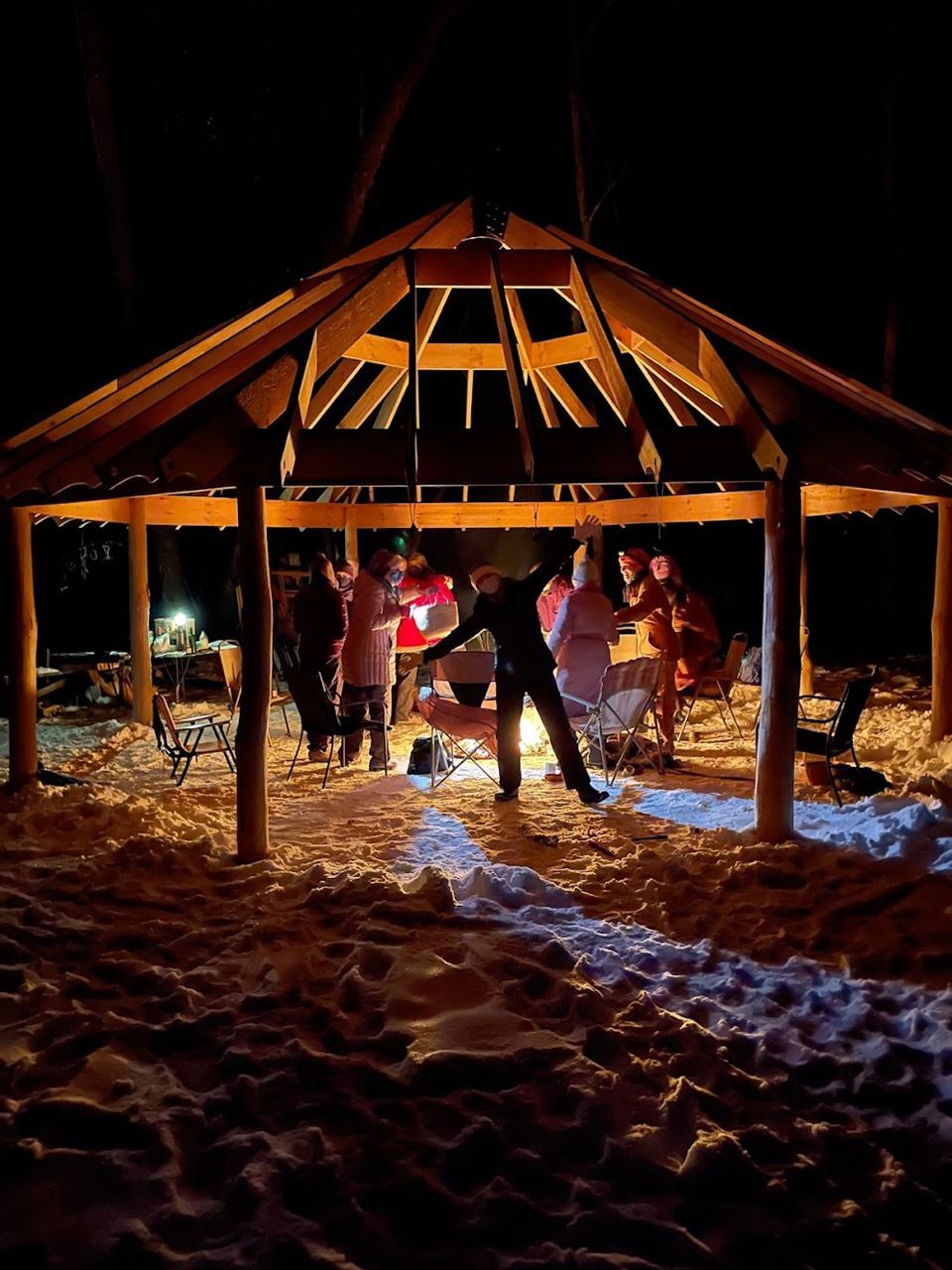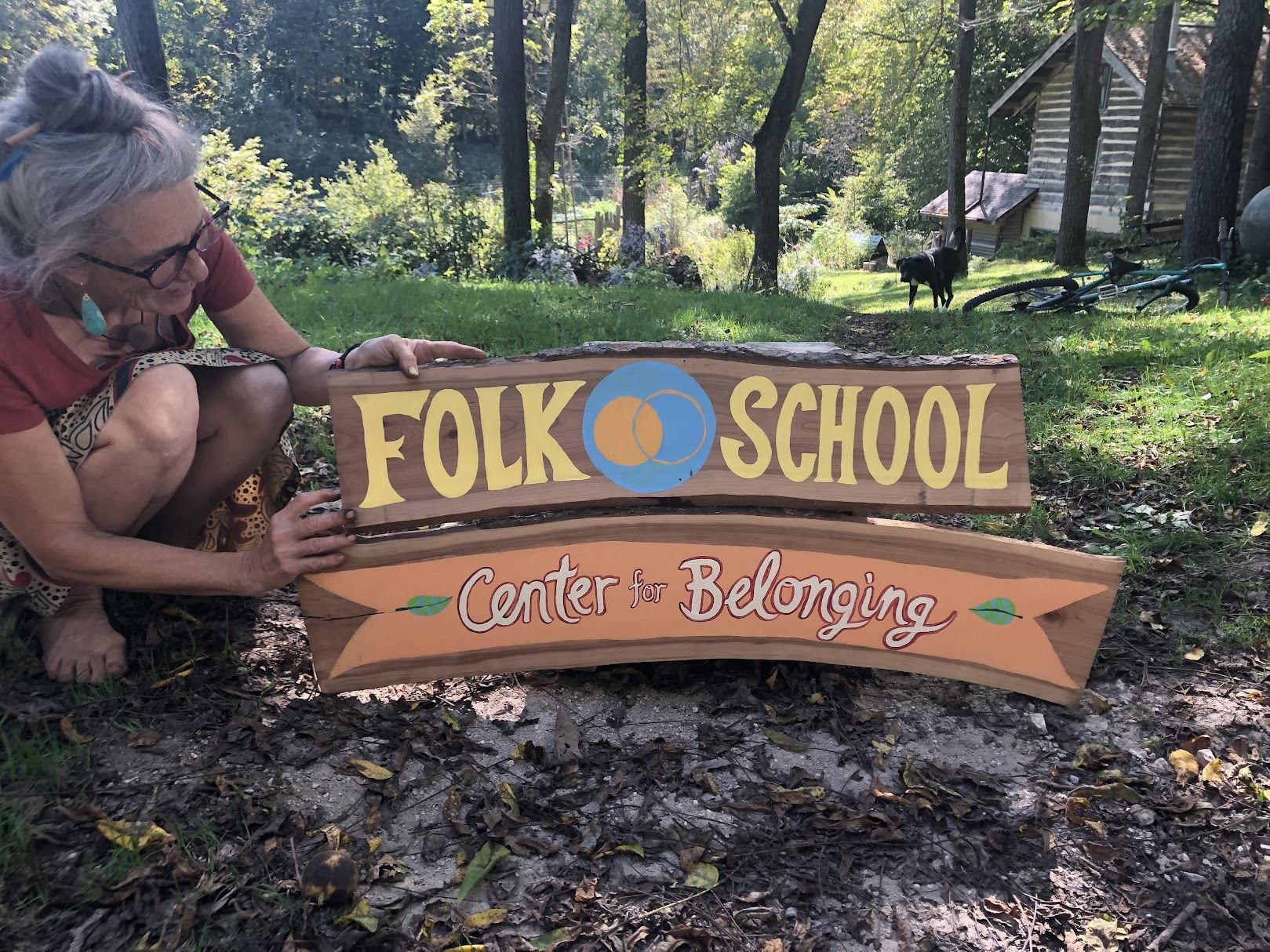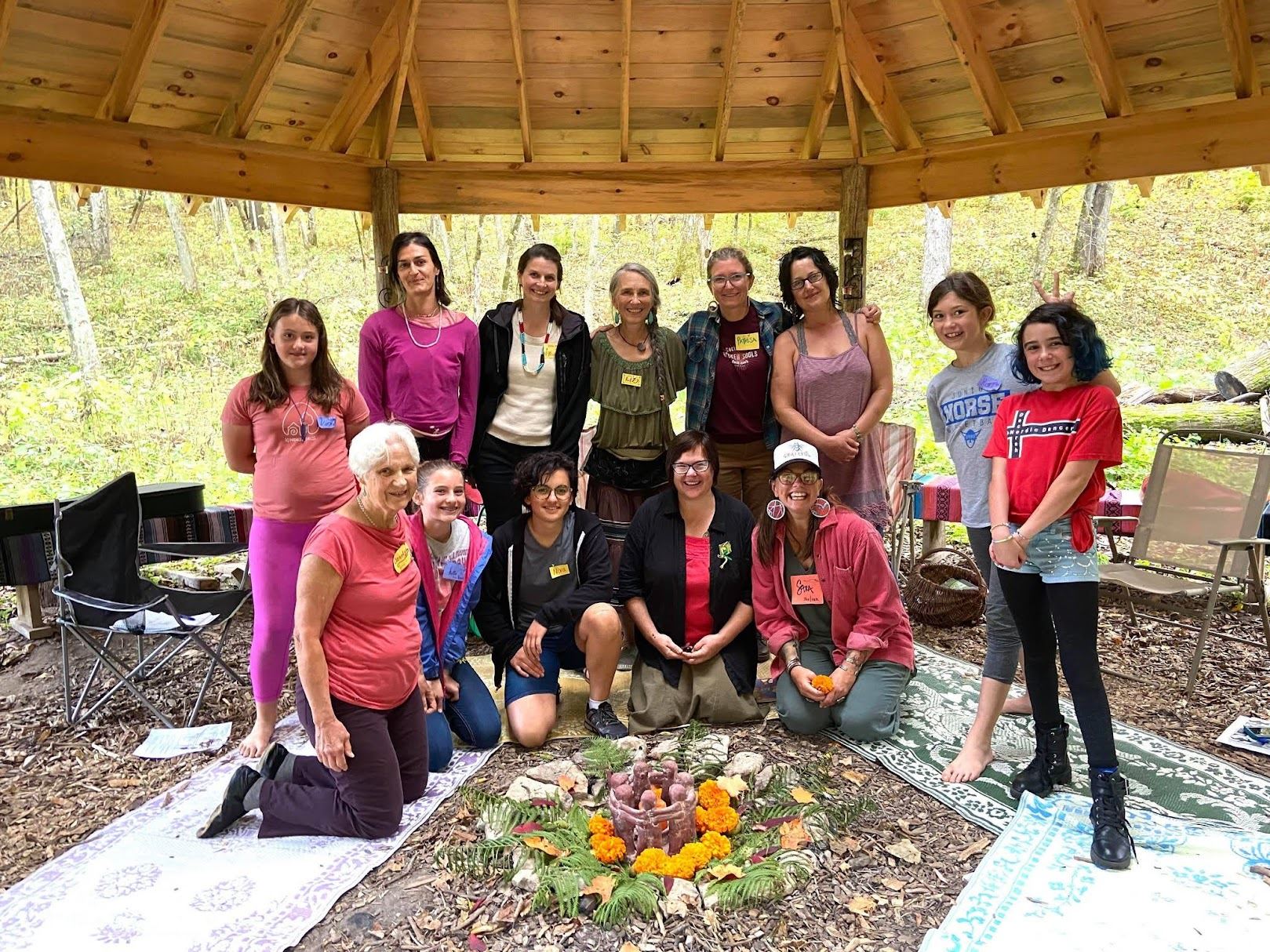By Mary Cattani & Liz Rog
The real heart and soul of the new Center for Belonging Folk School (CFBFS) in Decorah, Iowa, is the endeavor to create community through shared experience and deep exploration of what builds connection among people. “Stoking connection, weaving community, welcoming into belonging,” these are some of the watchwords of this unique folk school, words that tug us along the path toward understanding these aims. Founded by Liz Rog, whose many involvements have made her a well-known figure already,* the school offers gatherings, events and classes that all take place outdoors, in her own back yard, a spacious, forested back yard with a traditional log cabin in it, where Liz and her husband raised their family, and where her parents and grandparents, and perhaps another generation back, were also joined in deep connection.
Nature is the teacher at CFBFS and is the center of every connection that is made. Everything at the folk school happens outdoors, under an open-air, but sheltering gazebo, and as Liz puts it: “Our gatherings require that we make ourselves comfortable together outside. This is something that many in our modern society seem to be longing for, and without a building to retreat to, it can call for our creativity and flexibility ….. We find that we are happy and safe together in nature, even when it’s cold, hot, wet, dark. “

CFBFS uses theater and music to instruct and to further its aims, song and story, art and craft, cooking and eating together as an integral part of what they do in weaving connection and building community. “Gatherings” is perhaps a better word for the groups involved than “classes” would ever be, and they offer these gatherings around not just handcrafting, cooking, or doing music together, but also deepening social and spiritual dimensions of community with such tools as nonviolent communication, conversation circles, conflict engagement, nature spirituality, seasonal festivals, and campouts.
All this in service of the main goals of the school: to help bridge divides among people with different economic, social, educational, political, racial, religious and gender identities. The folk school is committed to providing access to all through generous experimental ways of viewing and using money - sliding scales, free events, low overhead, gift economy, and other means as they present themselves.
As Liz puts it: “We are new, fresh, emergent, and in an exciting phase of our existence. As such we are fertile soil for catching seeds on the wind that life is blowing our way, both from the past and from the future. Starting a folk school in this time, we are influenced not only by Grundvig, Paulo Friere, the Highlander Folk School, and the various social movements of the 1960s and 70s, but also by adreienne maree brown, George Floyd, the pandemic, climate chaos, the conditions that brought about the election of Donald Trump, and more.“
*Liz is organizer of “Village Fire, Intergenerational Outdoor Community Singing” an event in the Upper Midwest, which happens when there is no pandemic, and a member of “Decorah Now, Building Community through Arts, Cultural, and Recreational Events,” among her many other involvements.

So, here, then, is the Origin Story of the CFBFS, as told by Liz Rog, its founder, edited from the original for length:
The Center for Belonging Folk School
Origin Story
Liz Rog, Oct 2021
Each of us, and each thing that we create, is born of those and that which came before. We are the next ones, carrying the stories and dreams from the past forth into their new shape, the new possibilities and needs of this time.
The Center for Belonging was given a name, a roof, and a hearth in January 2021, but arises from many things. Her ancestors include:
- The Settlement Houses in Minneapolis where my dad’s Polish immigrant family found its footing among other immigrant families from Syria, Italy, and other lands ;
- The Highlander Folk School in Tennessee, birthplace of the American Labor Movement and Civil Rights Movement, where song and dance were woven into each day because they knew that beauty and joy could would be necessary to sustain them through the long haul.
- Liberation Theology, and the Women’s movement(s), Civil Rights, Alternative Education, Co-op, Wild Church, and Ecology Movements.
- Traditional Skills camps, sometimes called ‘Skill Shares.’
Locally, it grows from:
- experiments with education models that are small, grassroots, and intergenerational
- family camps, singing camps, kids camps, church camps
- women’s spirituality circles and leadership lounges
- rituals old and new to honor the seasons of earth and the seasons of human life
- the re-emergence of community singing; songs for these times that can easily be sung together by non-professionals.

Isn’t it often from times of frustration and unsettledness that we can finally articulate a need and a longing that had been churning beneath the surface for months or years? This is how it was for me In 2019 as I was approaching 40 years of having lived in this place, using my creative energy and care to seed many different spaces for weaving belonging in community: gatherings, celebrations, rituals, camps, workshops, retreats, parties, and more. For I was born this way, always imagining the next chance to gather with others. This is what I myself need, regularly, in order to know my place among everything. This is what I was given to do.
Perhaps it was my approaching 60th birthday, or perhaps Covid, and George Floyd, and the next western fires which were already whispering of their coming. Whatever it was, in early 2019 I was compelled to take out a piece of tagboard and write down everything I could think of that I have seeded, tended, or dreamed in this place. I made 7 bubbles in a ring and named them: Ritual, Neighborhood, Camps, Singing, Celebration, Learning Together, and _____. In the center of the ring I made a circle and called it: Center for Belonging. I showed that map to a few friends and then forgot about it...but not really.
Journal, Oct 13, 2020: ‘I know that the things I tend in this place are both old and new, (and) if they will live on past my aging and dying self, something needs to change.
Now is the time: I need a team. People younger than me, to bring their own vision and voice.
Journal, Nov 16 2020: “What if there were enough special shared outdoor spaces in this neighborhood that one could feel the pathways to them and between them ever-renewed by the eager and grateful feet that walked them? What if my job were to hold the shuttle, to help community weave the designs that we choose?”
Journal, Nov 26, 2020. “I think in gatherings. What is the language of gatherings? Circle, voice, wind, fire, earth, spirit, soul, laughter, tears, vulnerability, courage, moment, song, creativity, improv…”
January 6 2021 brought the insurrection at the US capitol and somehow blew a big wind into the sails of the Center for Belonging. We had been building a gazebo in the woods where we live, inspired by Covid times’ need for more outdoor gathering spaces that were protected from rain and snow. After the insurrection some local friends got together and decided that the Center for Belonging must be created, and to show me their encouragement they sent a few thousand dollars! How powerful that money-energy was; for even though I didn’t know what was to become and therefore had no ideas yet how money would be used, that gift of money played a key role in what was already being created: the gazebo in the woods.
But I was certain that I needed a team. I named the leadership team the Shuttle instead of Board of Directors. I was looking to create something fresh and whole: a group that valued and included attention to relationship-building with each other, with earth, with spirit. I named some of the many qualities, interests, and capacities that would be valued on the shuttle team: vision-holders, grief-tenders, play-bringers, archivists, numbers lovers, self-care and other-care givers, business thinkers, friends of digital doings.
And so we have gone forth. I make agendas and send them out in advance, but when we meet we often change course depending on what arises. When I send out minutes they are sometimes typed but sometimes an audio file so that people can listen while they do something else.
What are we doing here, so far? Here are some recent examples:
- Creative Writing Workshop
- Intergenerational Singing Camp
- Family Bird Exploration Day
- Oak Tending Workshop
- Grief and Renewal: Community Tending of Pandemic Fatigue
- Week-long day camp for kids
- Foraging for Wild Salads
- Story and Song Retreat
- Non-Violent Communication workshop
- Basket Weaving
We look forward to much more from the Center for Belonging Folk School!
